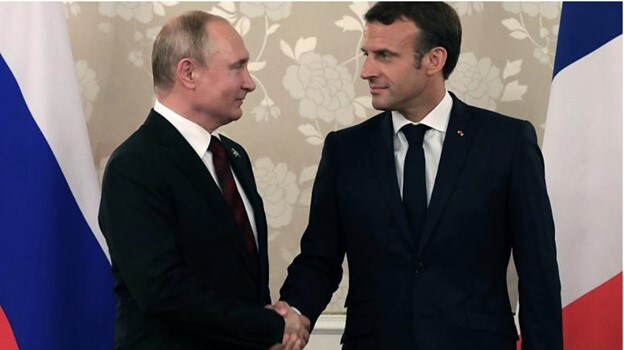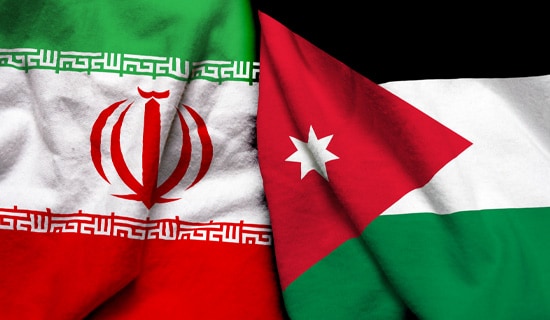The two candidates that have made it to the second round in the French presidential elections are, as in the previous elections in 2017, President Emmanuel Macron and his challenger Marine Le Pen. In 2017, official Russia smiled on Le Pen, who during a visit to Russia had met with members of the Duma and with Vladimir Putin. Putin has received Marine Le Pen in the Kremlin in a surprise move likely to reignite fears in Europe about Russian support for the European far right.
In 2017, Putin had told Le Pen that while Russia would not meddle in the French presidential elections, "we [Russia] retain the right to meet with all the different political forces, just like our European and American partners do." Putin expressed interest in sharing views with his guest and in bilateral relations and developments in Europe, because Le Pen, he said, represented "a European political force that is growing quickly."
Le Pen reciprocated by stating: "A new world has emerged in the past years. This is Vladimir Putin's world, Donald Trump's world in the United States, Mr. [Narendra] Modi's world in India... I think I am probably the one who shares with all these great nations a vision of cooperation and not one of subservience."[1]
In the current French election, both parties are more guarded towards each other. Le Pen has condemned Russia's invasion of Ukraine, although continuing to support its 2014 annexation of Crimea, but has ruled out a visit to Russia as long as the "special operation" continues. That said, Le Pen should ostensibly be the candidate preferred by Russia. Although she has ruled out a French withdrawal from the EU, a Le Pen victory would surely cause major turbulence in that organization. Le Pen also opposes French subservience to the U.S. within NATO, as well as the special relationship with the Federal Republic of Germany. On the Ukraine issue, she believes that Ukrainian President Volodomyr Zelensky should moderate his demands.
Nevertheless, Russia is not showing support for Le Pen's candidacy. Perhaps the main reason for this is that Moscow has written off Le Pen's chances to score an upset victory. A second reason is that there is little difference between Le Pen and the incumbent Macron, now that Le Pen has moved increasingly to the center and has toned down her views since 2017. Finally, Russia has reasons to opt for Macron and predictability over the untested Le Pen.
This report focuses on Russian attitudes towards the current French presidential elections:

Putin and Macron meet prior to the G7 summit in Biarritz in August 2019.
Macron Is The Preferred Candidate
In an article titled "Moscow Benefits More from Emmanuel Macron's Victory," Kommersant foreign affairs expert Maxim Yusin embraced the argument that Le Pen had no chance on the second round. However, he went further and argued that a Macron victory was preferable for Russia. He wrote: "It seems that Macron is going to win. And if 5 years ago, in a similar duel in the second round, the Kremlin's sympathies were on Le Pen's side (she was even paid a visit to President Vladimir Putin), today the situation is not so unambiguous. She tries not to mention her ties with Russia anymore. After the tragedy in the Ukrainian city of Bucha became known, Le Pen demanded the recall of the French ambassador from Moscow. Macron didn't go for such a radical move. In addition, she maintains close ties with the right-wing Polish government, which advocates the toughest possible sanctions against Russia.
SUPPORT OUR WORK

"As for Macron, he is just advocating the need for dialogue with Putin, for which he is mercilessly criticized by the same Poles. So it's not certain that this time the Russian authorities should want Marine Le Pen's victory. During the crucial moments of world history (and this is exactly what we are experiencing right now) it is more secure and reliable to deal with systemic, predictable, and experienced politicians."[2]
There Is Little Difference Between Le Pen And Macron
Another line of commentary argued that Macron was not all that bad for Russia, while Marine Le Pen was less of a bargain than in 2017.
Komsomolskaya Pravda took note of Macron's objection to Joe Biden's characterization of Russia's actions in Ukraine as "genocide". Macron while decrying the situation noted that it was necessary to exercise caution as "these are fraternal peoples. Russians and Ukrainians are fraternal peoples." Later, Macron added that verbal escalation [such as Biden's] only exacerbates the already difficult situation in Ukraine. "Genocide is a legally extremely clear definition that does not correspond to the currently known facts," Macron said in an interview with with France 2.
Le Pen was applauded for maintaining her position on the legality of Russia's annexation of Crimea in an interview with a Russian outlet: "Crimea was Ukrainian for only 27 years, all the inhabitants are Russians, they wanted to join Russia."[3]
Dmitry Bavaryn, in an article for Vzglyad claimed that Le Pen's move towards the center also included moving to a more consensual position on Russia:
"However, she is not at all the 'friend of Russia' that she was previously considered according to the model of 2017... the leader of the National Rally supports anti-Russian sanctions and condemns the special operation in Ukraine...In other words, against the pan-European and pan-French background, Le Pen is now also a 'moderate' on the Russian issue – not a 'pro-Russian candidate', but 'moderately anti-Russian'.
If defying the odds, Le Pen won, Baviryn believed that her transformation into a rational candidate would be good for Franco-Russian relations. A candidate, who understood objective benefits would be better than a candidate given to "seasonal emotions." Russia was not looking for a leader, who said "I love you" but one, who said "let's be selfish. Such a marriage of convenience can become truly resilient.[4]

Dmitry Baviryn (Source: Theoryandpractice.ru)
Le Pen's Chances Of Winning Are Exceedingly Slim
Sergei Fedorov, an expert on France at the Russian Academy of Sciences' Institute of Europe and expert on France, claimed that Marine Le Pen's success in the first round of the presidential voting wouldn't allow her to defeat Emmanuel Macron in the second round. There were things to recommend Le Pen, who opposed the supply of arms to Ukraine and advocated a withdrawal from the NATO military command, as Charles de Gaulle did back in the day.
However, "To claim that Le Pen is a pro-Putin candidate, who treasures Russia and is willing to abruptly change French foreign policy is an exaggeration that exists in Russian journalistic circles. Actually, Le Pen is a national leader who is sympathetic to Russia, but has nevertheless condemned the special operation in Ukraine and urged to a diplomatic settlement of the conflict."
Fedorov predicted that Macron would coast to victory in the second round and this offered more of the same for Russia: "One can abstractly speculate, that Macron, who pursues a course of tough dialogue with Russia, insists on positions, condemns and would compel a withdrawal of troops from Ukraine through pressure and sanctions that constantly grow stronger will win. Probably, Macron will continue to pursue this course."
It was a matter of simple electoral math. Le Pen could only pick up the 7% who voted for Eric Zemmour, while the votes for the other leading candidates would gravitate to Macron. "Almost all the candidates, especially the left-wing ones who ran in the first round of election, urged their supporters to vote for Macron in the second."[5]




